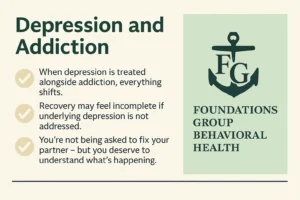When your partner is struggling with addiction, people often assume the problem is clear. That the issue begins and ends with drinking or drug use. But if you live with them—love them—you know better. You’ve seen it: the quiet that settles in after the high wears off. The blank look, the long silences, the emotional absence.
Sometimes, addiction isn’t the only thing in the room.
Sometimes, it’s sitting next to depression—and the two are feeding each other in ways that are hard to untangle.
If this sounds familiar, you’re not alone. Many partners feel confused, exhausted, and helpless when their loved one seems lost in a cycle of using and shutting down. But there’s one truth that might help: recovery doesn’t work the same way for everyone. And for people battling both depression and substance use, Depressive Disorder Treatment in Massachusetts isn’t just helpful—it’s often essential.
Addiction and Depression Are Different—but They’re Often Linked
Maybe your partner drinks too much or disappears for days. But underneath that, there’s a pattern you’ve noticed: a heavy sadness. A kind of hopelessness that no argument, no break-up, no tough love seems to shake.
You might be asking:
- Are they using because they’re depressed?
- Or are they depressed because they’re using?
- How do I even begin to help when both are happening at once?
The answer is complicated—but also hopeful. Depression and addiction often show up together. This is called co-occurring disorders, and it’s more common than you’d think.
And while each condition has its own shape, they tend to reinforce one another. Depression dulls motivation. Addiction offers temporary escape. But escape usually leads to guilt, isolation, and more depression. It’s a cycle. A heartbreaking one.
But it’s also a cycle that can be interrupted—with the right kind of care.
Treating One Without the Other Doesn’t Always Work
You might’ve already watched your partner try to get clean or go to rehab. Maybe they made it a few weeks—or even a few months—before the depression crept back in and they slipped again. Maybe they came home sober, but still angry, still shut down, still unreachable.
When depression is part of the picture but isn’t treated directly, recovery often feels incomplete.
It’s like removing the bandage without treating the wound underneath.
Foundations Group Behavioral Health understands this. Their Depressive Disorder Treatment program in Cape Cod focuses not just on what your partner is using—but why they need to escape in the first place.
Depression Doesn’t Always Look the Way You Expect
There’s a common myth that depression = crying in bed. But it’s often more subtle. Especially in men, or in people who use substances, depression can show up as:
- Irritability or anger
- Low motivation or lack of follow-through
- Isolation, even from people they love
- Fatigue or oversleeping
- Numbness or “not caring” anymore
- Thoughts like “everyone would be better off without me”
If your partner has said things like:
- “I’m just tired of everything.”
- “I don’t feel anything anymore.”
- “What’s the point?”
…it might be time to look beyond the addiction and consider whether depression needs treatment too.
You’re Not Crazy for Thinking Something Else Is Going On
One of the hardest parts of loving someone who uses is the way reality gets blurred. You start second-guessing yourself. You wonder if you’re overreacting. You make excuses—but also feel resentful. You try to draw boundaries, only to feel guilty later.
But deep down, if you’ve noticed something else—something sad, flat, or defeated in them—you’re probably right.
It’s not enabling to recognize that depression may be part of what’s happening. It’s not naive to believe that something deeper is going on.
And it’s okay to want to help in a way that’s grounded in understanding, not just punishment or pressure.
Depressive Disorder Treatment Gives Recovery a Fighting Chance
When depression is treated alongside addiction, everything shifts.
- Therapy becomes about why they use—not just how to stop.
- Medication may stabilize moods, making relapse less likely.
- Emotional numbness begins to lift, making joy (and connection) possible again.
- Recovery feels like building something—not just losing something.
In programs like those offered in Barnstable County and Falmouth, MA, depressive disorder treatment isn’t an afterthought—it’s part of the plan. That matters more than most people realize.
This Isn’t Your Job to Fix—But You Deserve to Understand It
Let’s pause here. Because if you’re reading this, there’s a good chance you’ve been carrying the emotional weight of this relationship for a long time.
You’re probably the one searching, asking, researching. You’re the one holding it together.
You’re not being asked to fix them.
But you are allowed to understand what’s happening.
You are allowed to ask whether depression might be part of the reason they feel so unreachable.
And you’re more than allowed to reach out—not just for their sake, but for yours too.
Starting With Education Is Still a Step Forward
Many partners feel stuck waiting for their loved one to “hit bottom.” But that’s not the only way forward.
Sometimes, the first step is just asking questions. Quietly. Without pressure.
You can reach out to a treatment provider like Foundations Group Behavioral Health in Cape Cod and say, “I think my partner might be struggling with both addiction and depression. Can I talk to someone about that?”
You don’t need a diagnosis. You don’t need the perfect words. You just need a tiny bit of curiosity. That’s more than enough.
FAQs for Partners of People Facing Addiction and Depression
Is depression always a part of addiction?
Not always, but they often co-exist. Many people struggling with substance use have underlying depression that either precedes or results from their addiction. Treating both gives the best chance at long-term recovery.
How do I know if my partner is depressed or just burned out from using?
If your partner seems numb, unmotivated, hopeless, or emotionally distant even when not using, it could be depression. A professional assessment can help you know for sure.
Can they start depressive disorder treatment if they’re still using?
Yes, many programs—including Foundations Group Behavioral Health—support people with co-occurring disorders and recognize that full sobriety may not happen before treatment starts.
What if they’ve tried to get clean before and it didn’t work?
Relapse is common, especially when depression hasn’t been addressed. If previous treatment ignored the emotional side, a program that includes depressive disorder care might help where others didn’t.
Can I get help, even if they won’t?
Yes. You can talk to a counselor, join a support group, or speak with a treatment provider to better understand your options. You matter in this, too.
Is there a program like this near Cape Cod?
Yes. Foundations Group Behavioral Health offers depressive disorder treatment in Cape Cod, including options for individuals with co-occurring addiction. You don’t have to go far to get support.
You’re Not Asking for Too Much
Wanting peace in your relationship isn’t too much.
Wanting your partner to feel joy again isn’t too much.
Wanting to love someone without constantly bracing for collapse—that’s not too much either.
The truth is, depression and addiction together are incredibly heavy. But they are treatable. And treatment that sees both doesn’t just help your partner—it helps the relationship you’re trying so hard to hold together.
If your gut says something more is going on, listen to it. And know that compassionate, integrated help is available—right here in Cape Cod.
You don’t have to hold this alone.
Call 888-685-9730 or visit our Depressive Disorder Treatment page to learn more about services that address both depression and addiction—because your love deserves support, too.









